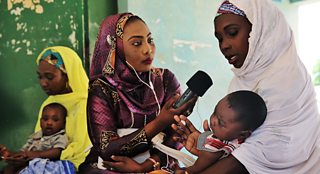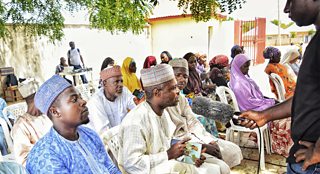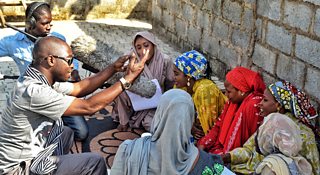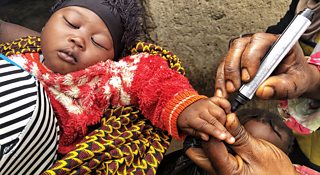Live drama tackles community attitudes to polio vaccination in Nigeria
Nasiru Mu’azu Isa
Producer, Βι¶ΉΤΌΕΔ Media Action Nigeria
On World Polio Day, we’re looking through the lens of Nasiru Mu’azu Isa, one of our Producers in Nigeria. Part of our team for over a decade, Nasiru has been instrumental in the production of Madubi Live, a live adaptation of our radio drama that visits communities to record in front of an audience and encourage live discussions about child immunisation, especially the polio vaccination.
When I grew up in Northern Nigeria vaccinations were common – so I was vaccinated as a child. But in the early 2000s, rumours that the polio vaccination was harmful began to spread and many people stopped vaccinating their children. Adding to this, technology has increased the speed at which this kind of fake news is spread, and this is contributing to continuing lower levels of immunisation in Northern Nigeria.
There are several other health challenges in Northern Nigeria, such as long distances to get to health centres for the remotest communities, and cultural and religious beliefs that can prevent families from getting their children vaccinated. And in some areas, conflict may stop health workers from reaching communities or people from getting to health centres.
In 2014, we began working with UNICEF on a multi-media approach to address the socio-cultural norms and beliefs posing barriers to behaviour change amongst caregivers. The work aimed to help people make informed decisions about fully vaccinating their children, particularly against polio, in high risk areas.

We created a radio drama, Madubi (The Mirror), a 15 minute, Hausa-language radio drama, focused on tackling polio vaccination, routine immunisation and other family health issues. By integrating characters, issues, challenges and storylines that reflect socio-cultural values and belief systems of different communities and ethnic groups across Northern Nigeria – it had audience appeal and became popular. Following the success of Madubi, we decided to bring communities together for Madubi Live events, to watch live recordings of episodes. We have taken Madubi Live events to remote areas where people have limited or no access to radio and we always encourage the audience to take part in discussions based on storylines around polio, vaccinations and childcare. Community leaders join in too, adding legitimacy and helping us sustain our impact, while health experts and UNICEF staff are on hand to answer questions too.

We know Madubi Live is working. Community leaders say they’ve had far greater success in encouraging vaccination through these participatory events. To ensure audiences were more likely to trust what they heard, we made sure to include religious leaders alongside our actors and health experts. In these communities it is uncommon for men and women to attend events together, so while in some areas we had women-only audiences to make sure women could join in, Madubi Live also provides an unique opportunity for communal discussion. In two of the areas Madubi Live visited, health officials attribute big increases in the uptake of vaccinations to the transformative power of the live event. Seen as prestigious, the events are a source of great pride by communities and our partner UNICEF, told us that hospital visits spike after our live productions. When I walk around communities in my spare time and hear people talk about our productions, it feels great. It confirms that our method is working, and people are changing their lives for the better.

My favourite part of the production process? Visually seeing the stories you have spent weeks, sometimes months creating, brought to life. You may laugh while writing parts of the script, but the anecdotes really hit home when you see the actors perform. Stage work is unique and this is what makes Madubi Live very special: the audience gives you an instant response, and there is no room for second takes. It keeps you grounded and ensures your work is uniquely tailored and adapted to fit your audience. It epitomises why I love drama. My dad never understood why I studied theatre and drama, but seeing my work with Βι¶ΉΤΌΕΔ Media Action changed his mind. He is proud of my work and of our impact.

At the time of writing, there have been no reported cases of wild polio virus for three years in Nigeria, but our support cannot end here. Some communities in southern Nigeria, including in Lagos, are rejecting vaccinations. Particularly in the busy urban environment of Lagos, where security is an issue, people are reluctant to trust others and are sceptical of strangers entering their communities, especially if they look like they represent government. Residents are more focused on immediate issues like lack of electricity than they are on immunisation. And the increase in anti-vaccination sentiments on social media risk reinforcing old rumours and fake news about vaccination campaigns in Northern Nigeria – so our work doesn’t stop here.
We will continue to develop Madubi Live because we know it plays a key role in sustaining the long-term change in social norms and behaviours needed to protect Nigerian children against childhood illnesses, including polio, through vaccination.
--
Nasiru Mu’azu Isa is a Producer for Βι¶ΉΤΌΕΔ Media Action in Nigeria
Learn more about MERCI (Media Engagement for Supporting Demand Creation for Childhood Immunisation) our project funded by UNICEF here.
